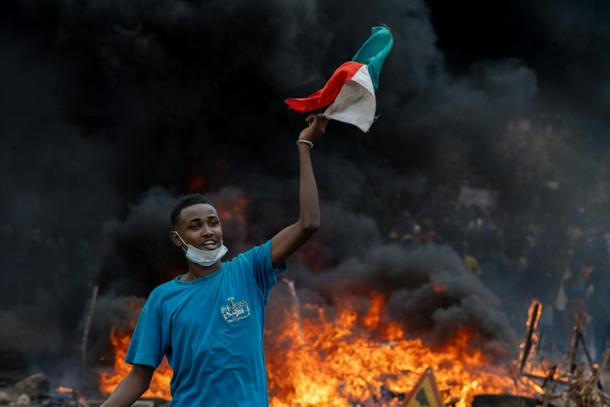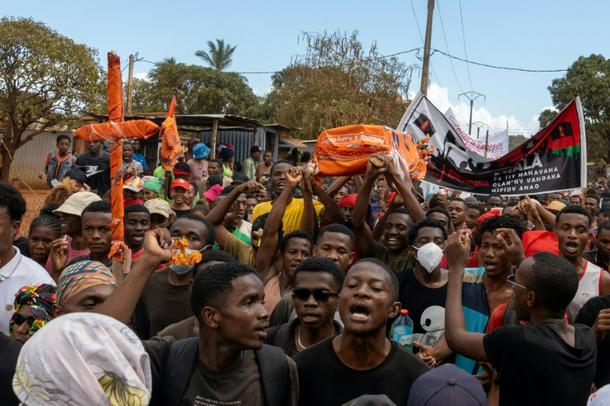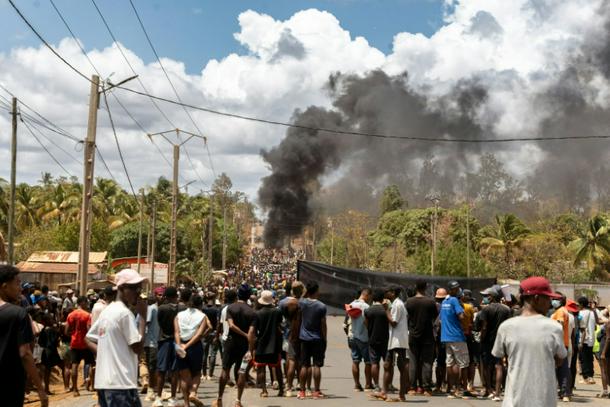
Demonstrators are calling for President Andry Rajoelina to step down
Antananarivo (AFP) - Supporters and opponents of Madagascar’s cornered government faced off at a distance in the capital Antananarivo on Saturday, after days of deadly youth-led protests that the president has called an attempted coup.
The protests, inspired by similar drives in Bangladesh, Nepal and Indonesia, and led by an online youth movement known as Gen Z Mada, have tapped into widespread frustration over poor governance, with demonstrators calling for President Andry Rajoelina to step down.
At least 22 people have been killed and hundreds injured, according to the United Nations, a toll the government has dismissed as based on rumours or misinformation.
The anti-government protesters attempted to converge in the centre of Antananarivo but were prevented by a heavy police presence.
Officers erected roadblocks, including in the Ambondrona neighbourhood.
“It’s the shortest route to Ambohijatovo,” said 18-year-old student Ilan Randrianarison, referring to their planned meeting point, nicknamed “Democracy Square”.
“Given the massacres, the protesters are getting angrier and angrier. We’re here for our comrades,” he said, wearing a straw hat that has become a symbol of defiance.
Police fired volleys of teargas to disperse hundreds of protesters who had gathered on the shores of Lake Anosy in the capital, many of whom were also trying to reach Ambohijatovo.
“Do you see what they’re doing to us? It’s because of the president that the gendarmes are attacking young people,” 17-year-old high school student Diary Tombontsea told AFP. “He doesn’t care about us at all.
- Out of touch -
In the capital’s main Independence Avenue, armoured vehicles and military police stood guard.

Hundreds of students marched in the northern city of Antsiranana
Some officers killed time on their phones, played cards or napped in the shadow of city hall.
Supporters of the embattled government meanwhile met at the Coliseum – a Roman-inspired amphitheatre inaugurated by Rajoelina in 2012.
That rally attracted fewer people than the anti-government protests.
In the northern city of Antsiranana, hundreds of students also marched, waving placards and carrying a mock coffin covered with orange fabric emblazoned with the image of Rajoelina, AFP journalists saw.
Rajoelina, who has rejected calls to resign, on Saturday shared footage of a meeting with trade unions.
The 51-year-old former mayor of Antananarivo said on Friday he was ready to listen in order to find solutions to problems facing the poor island nation.
He condemned what he said was an attempt to topple his government, without naming who he alleged was behind the move.
Gen Z Mada has rejected Rajoelina’s overtures, saying his remarks were “completely out of touch with the gravity of the situation our country is facing”.
“You claim to invite dialogue, yet your words stigmatise precisely those you claim to be listening to,” the group said in a joint statement with some 20 other organisations.
- Mediation -
The Council of Christian Churches in Madagascar, known by its Malagasy acronym FFKM and led by Catholic Archbishop Jean de Dieu Raoelison, said on Friday it was ready to mediate between the government and demonstrators.

The protests were sparked by public anger over constant water and power cuts
The protests, sparked by public anger over constant water and power cuts, forced Rajoelina to sack his government on Monday but that was not enough to placate the anger.
The rallies, which began on September 25, are the latest bout of unrest in Madagascar since it gained independence from France in 1960, posing the most significant challenge to Rajoelina’s tenure since his 2023 re-election.
Rajoelina first came to power in 2009 following a coup sparked by an uprising that ousted former president Marc Ravalomanana.
Despite its natural resources, Madagascar remains among the world’s poorest countries.
Nearly three-quarters of its population of 32 million were living below the poverty line in 2022, according to the World Bank.
Corruption is widespread and the country ranks 140th out of 180 in Transparency International’s index, which ranks countries by their perceived level of public sector corruption.